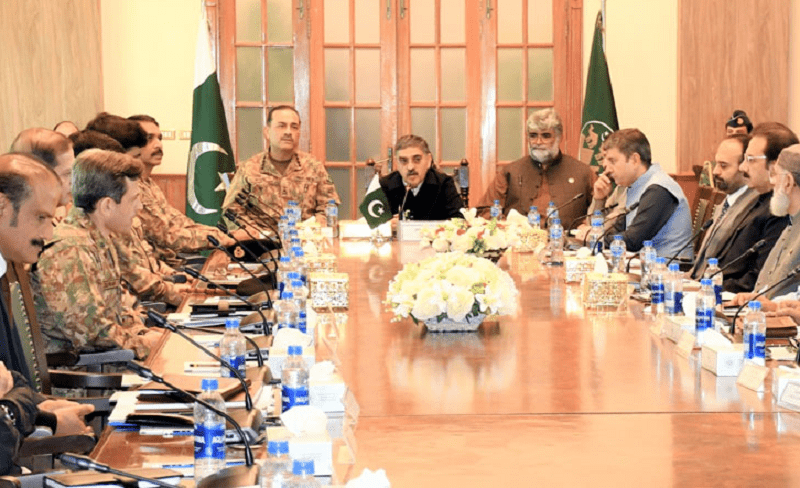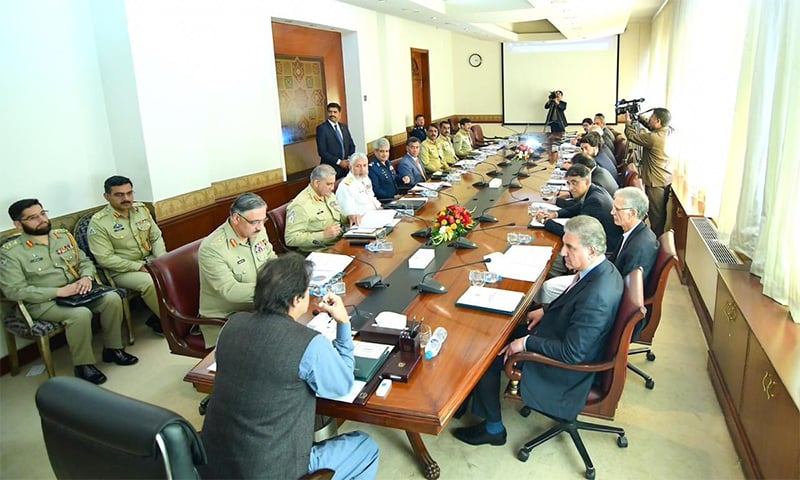The state head was recently advised of an “unscheduled” meeting between the head of the armed forces staff (COAS) and delegates of the Pakistan Tehreek-e-Insaf (PTI) party. The gathering, which occurred without earlier notification, has sparked massive interest because of its unforeseen nature and the key figures involved. While the subtleties of the conversation remain primarily undisclosed, the timing and setting of the gathering have raised issues about its expected ramifications for the political scene in Pakistan.
The COAS, at the top of the military, assumes a significant role in the nation’s administration and security. At the same time, PTI, driven by the previous head of state, Imran Khan, remains a noticeable political power. The gathering’s unscheduled nature has prompted a hypothesis regarding its motivation, especially considering the continuous political turns of events and difficulties confronting the country. The Head of the State’s advice regarding this situation highlights the significance of figuring out the elements between the military and political substances, particularly in such dubious times.
Context of the Meeting
The COAS is the most elevated positioning official in Pakistan’s military, standing firm on a critical foothold in the public safety device. The PTI, driven by previous State leader Imran Khan, is a significant ideological group in Pakistan. The gathering between the COAS and PTI administrators occurred against the backdrop of a politically charged climate in the nation following considerable improvements in the nation’s administration, security concerns, and military impact on regular citizen matters.
The gathering was essential for progressing conversations among political and military innovators in Pakistan. Such connections are fundamental to maintaining overall influence and guaranteeing strength in the country, which is grappling with inner political divisions, financial difficulties, and security dangers.
Political and Security Landscape
The political scene in Pakistan has been undergoing massive disturbances lately, with the PTI being a focal figure in the political discussion. Under the initiative of Imran Khan, the PTI had areas of strength in the 2018 general elections. However, following Khan’s ouster in a statement of overall disapproval in April 2022, Pakistan has been amidst political precariousness, with the PTI testing the authenticity of the ongoing government driven by the Pakistan Muslim Association Nawaz (PML-N) and united parties.
At the same time, Pakistan has confronted security challenges, especially in its western regions, with progressing aggressiveness, financial shakiness, and discretionary difficulties with adjoining nations. The military, being a persuasive organization in Pakistan, has consistently assumed a critical role in dealing with these issues, frequently engaging with ideological groups to guarantee the country’s stability.
Details of the COAS-PTI Meeting
The meeting between the COAS and PTI leadership was expected to focus on various key national issues, including the military’s role in governance, national security, and political stability. Several points of discussion during this meeting likely included:

- Security Situation: Given the increasing militancy and geopolitical challenges, the COAS briefed the PTI leadership on the latest security developments, including the situation in Khyber Pakhtunkhwa and Balochistan, regions that have experienced increased militant activity recently. The military’s operations against insurgents and terrorist groups, as well as efforts to maintain peace in the area, would have been central topics.
- Political Stability and Governance: The PTI leadership, particularly after the ousting of Imran Khan, has been vocal in its criticism of the current government and has demanded early elections. The COAS’s engagement with PTI may have been aimed at fostering political dialogue and reducing tensions between the military and political actors to ensure that the government can function effectively amidst political unrest.
- Military’s Role in Civilian Governance: Pakistan has a history of military involvement in political affairs, with the military having ruled the country for several years through direct military regimes. While Pakistan is a democracy, the military has often exerted considerable influence in national matters, especially in times of political instability. This meeting could have focused on clarifying the military’s current position regarding its role in governance and addressing PTI’s concerns about civilian oversight.
- Economic Concerns: Political instability has exacerbated Pakistan’s financial challenges, including inflation, unemployment, and fiscal deficits. The military’s perspective on how to tackle these issues and the PTI’s input on necessary reforms would have been essential parts of the conversation.
Role of the Prime Minister’s Briefing
Following the COAS-PTI meeting, the Prime Minister of Pakistan received a detailed briefing on the discussions held during the meeting. The briefing served several key functions:
- Insight into Military-Political Dialogue: The Prime Minister was updated on the latest developments between the military and PTI. This is particularly important as the government seeks to maintain a working relationship with both the military and opposition parties, including PTI, to navigate Pakistan’s complex political landscape.
- Strategic Decision-Making: The PM’s briefing provided crucial insights that would help inform the government’s decisions regarding national security, governance, and economic management. It allowed the Prime Minister to understand the military’s stance on various issues and the potential outcomes of political negotiations.
- Managing Tensions: The Prime Minister also defuses tensions between the military and opposition parties, including PTI. The briefing highlighted the importance of balancing military influence with democratic governance and maintaining the country’s stability.
Key Issues Likely Raised During the Briefing
Several key issues were likely brought to the Prime Minister’s attention during the briefing. These issues are critical in shaping the government’s approach to resolving national challenges:
- Election Delays and Political Gridlock: Following Imran Khan’s ouster, the PTI has been pushing for early elections. The briefing may have highlighted the political consequences of these demands and discussed possible compromises between the government and the PTI to resolve the issue of election timelines.
- Impact of Military-Political Relations: The Prime Minister was likely briefed on how the military’s current stance could impact Pakistan’s political stability. The military’s influence on Pakistan’s governance is significant, and the briefing would have assessed how the government could manage this relationship while ensuring democratic norms are respected.
- Security Threats and Military Operations: The Prime Minister would have been briefed on the evolving security situation, particularly regarding militant groups operating in the country. Pakistan’s military plays a key role in managing national security, and the Prime Minister would need to ensure cooperation between civilian and military leadership in dealing with these threats.
- Social and Economic Challenges: The briefing also likely discussed Pakistan’s current economic crisis, which includes high inflation, debt, and an economic slowdown. Political stability and the cooperation of military and political leaders would influence the government’s ability to address these financial issues.
Importance of Civil-Military Cooperation
The gathering between the COAS and PTI authority, followed by the State head’s advice, highlights the continuous need for standard military collaboration in Pakistan. Given the military’s basic job of maintaining security and overseeing political emergencies, the connection between the regular citizen government and the army authority is essential to Pakistan’s future.

A helpful methodology between the military and regular citizen initiatives can encourage public solidarity, reinforce administration, and guarantee that central questions, such as security and financial change, are successfully addressed. The state head’s contribution to the process ensures that majority rule standards are maintained while keeping up with the state’s solidity.
Possible Outcomes and Next Steps
Following the briefing, the Prime Minister may initiate several steps to address the key issues discussed in the meeting:
- Engagement with PTI: The Prime Minister may seek to initiate or deepen dialogue with PTI to address their political concerns, including early elections, while ensuring that the country remains stable.
- Strengthening Security Cooperation: The Prime Minister might focus on bolstering coordination between the civilian government and the military to tackle ongoing security challenges, particularly in the tribal regions and areas affected by insurgencies.
- Political Reconciliation: There may be efforts to engage in political reconciliation between the PTI and the ruling coalition to end the political standoff, ensure smoother governance, and reduce tensions that could destabilize the country.
- Economic Reforms: The Prime Minister, backed by the military’s perspective, may also push for urgent economic reforms, mainly focusing on stabilizing Pakistan’s economy in light of political instability.
Frequently Asked Questions
What is the COAS-PTI meeting about?
The gathering includes conversations between the Head of Armed Forces Staff (COAS) and Pakistan Tehreek-e-Insaf (PTI) delegates; however, the specific subtleties remain indistinct.
For what reason was the gathering unscheduled?
The gathering was held without earlier notification, which has raised questions about its motivation and the direness of the conversations.
Who went to the gathering?
The COAS and senior PTI agents were available; however, the particular names have not been unveiled.
For what reason is the Head of the state being informed?
As the head of government, the State leader is educated about key political and military connections that could influence public steadiness.
What is the meaning of this gathering?
The gathering’s unscheduled nature and the participants’ participation suggest that it could have significant ramifications for Pakistan’s political and military scene.
What could be examined in such a gathering?
Subjects might incorporate political turns of events, security concerns, or PTI’s situation on public issues.
How does this gathering influence what is happening?
It could impact political elements, particularly given PTI’s critical job in Pakistan’s governmental issues.
Does the gathering show a military contribution to legislative issues?
While the hypothesis exists, the tactical role in political issues has generally been delicate in Pakistan.
Is there any straightforwardness about the gathering?
The subtleties of the gathering remain generally undisclosed, powering hypotheses about its items.
What are the following stages after the instructions?
The Top state leader might choose to address the matter openly or take action based on the preparation items.
Conclusion
The unscheduled gathering between the Head of Armed Force Staff (COAS) and PTI delegates has mixed impressive interest because of its surprising nature and likely political ramifications. While the subtleties of the conversations stay indistinct, the gathering features the intricate connection between Pakistan’s military and political substances. The Head of the state’s advising recommends the significance of understanding the gathering’s specific circumstances, particularly considering continuous political difficulties and the vast job PTI plays in molding the nation’s future. Given the awareness of such communications, the public authority must guarantee straightforwardness and clearness in tending to any worries that emerge from this gathering.

